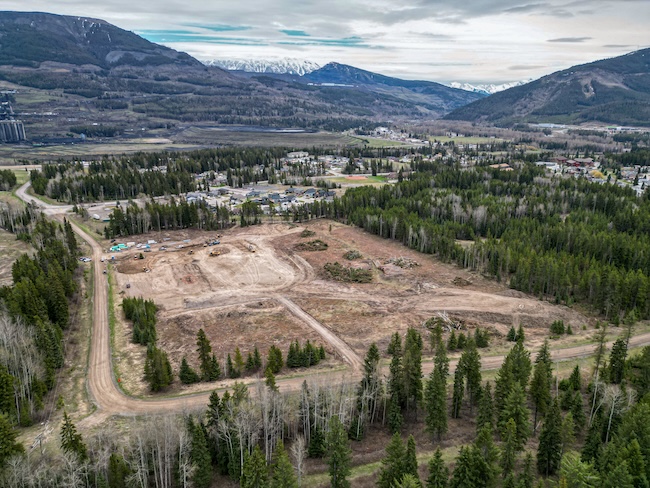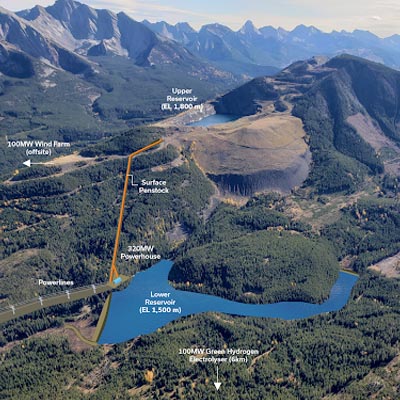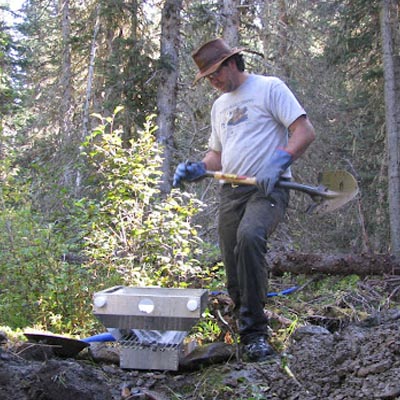An innovative discovery camp is coming to Williams Lake

Jacob Purdy is a heavy-duty equipment operator student in the BC Task Force apprenticeship program. — Gordon Armour photo At the end of June, Grade 8
Jacob Purdy is a heavy-duty equipment operator student in the BC Task Force apprenticeship program. — Gordon Armour photo
At the end of June, Grade 8 students in School District No. 27, Cariboo Chilcotin, will be getting a crash course in the endless possibilities of a career in the mining industry.
The BC HR Task Force: Exploration, Mining, Stone, Sand & Gravel (BC Task Force) is overseeing the pilot project that will be delivered at the Thompson Rivers University campus in Williams Lake, B.C. The four-day camp will be held at a forestry camp near one of the mines in the area. The forestry camp, normally used by the forest industry for education and training, will be the new home for students to learn about the different careers in the mining industry. The camp will involve engagement through resource materials, field trips, activities that explore technological advances, information on Canada’s role as a world leader in mineral exploration and mining, and real-world experience.
Gordon Armour wears two hats. He is both the chair of education and training for the BC Task Force as well as the district co-ordinator for transition, training and trades for School District No. 27. He said that more and more in education, the importance of engaging youth early is being realized.
"You have to hit youth early on with good information on career opportunities so they can start making more intelligent decisions as they go through the Grade 9, 10, 11 and 12 years," said Armour. "You can lose out by not choosing the right courses if you have a passion in a certain area. We want to influence students early with good, solid information so they can make these intelligent decisions. Grade 8 is the perfect year to start doing this. These kids will be able to connect what they learn in the camp with course requirements in school."
The camp will include a mine tour, and Armour said there will be an emphasis on safety, with students taking part in a mock mine rescue demonstration. The students will also learn GPS site mapping and see exploration demonstrations as well as heavy-equipment demonstrations or simulation. Prospecting and looking at mineral use in everyday life are other components of the camp.
This pilot project has come to fruition because of the hard work of the BC Task Force and the education sector; the process actually started last summer.
"The task force sent out a request for proposals early last summer to public post-secondary institutions in B.C. looking for pilot proposals that supported the goals of the task force," said Armour. "Some of those goals were things like increasing awareness into opportunities in the mining sector. We were looking at implementing pilots that led to sustainable practices that would focus on the task force's goals—and in doing so, we wanted the (deliverers) to collaborate with industry partners."
Armour said the idea of a pilot project is that it's a one-time process and after that it has to be sustainable without outside government funding. In other words, it needs industry partners that can take the success of the project and continue to deliver it after the process is done. It also has to be transferable to other jurisdictions within the province.
So once the education committee of the task force went through all the proposals it received, the committee members went through the process of making sure each proposal met the requirements and hit the certain targets set out for approval.
"Out of this, we found several proposals that had merit and worked with those industry proponents to polish up their proposals to meet the guidelines," Armour said. "As a result, the Thompson Rivers University Williams Lake campus proposal was accepted because we thought it was quite innovative and met all the guidelines. This discovery camp of exploration is going to be very unique."
Armour said it's important for young people to be aware of the vast array of opportunities in the mining sector because with the aging population of workers currently in the industry, the talent pool is beginning to dry up. There is a huge need for workers in all areas of the mining industry and this camp is just one way of encouraging youth to see what's out there and recognize how they can be part of a successful industry.
The mission of the BC Task Force:
The BC Task Force was initially formed in 2007 to identify the labour shortage facing mining in B.C. It later expanded its mission to include planning, developing and implementing pilot programs to ensure the mining industry in B.C. has the human resources needed to support the growth of the sector.
The BC Task Force was initially formed in 2007 to identify the labour shortage facing mining in B.C. It later expanded its mission to include planning, developing and implementing pilot programs to ensure the mining industry in B.C. has the human resources needed to support the growth of the sector.




